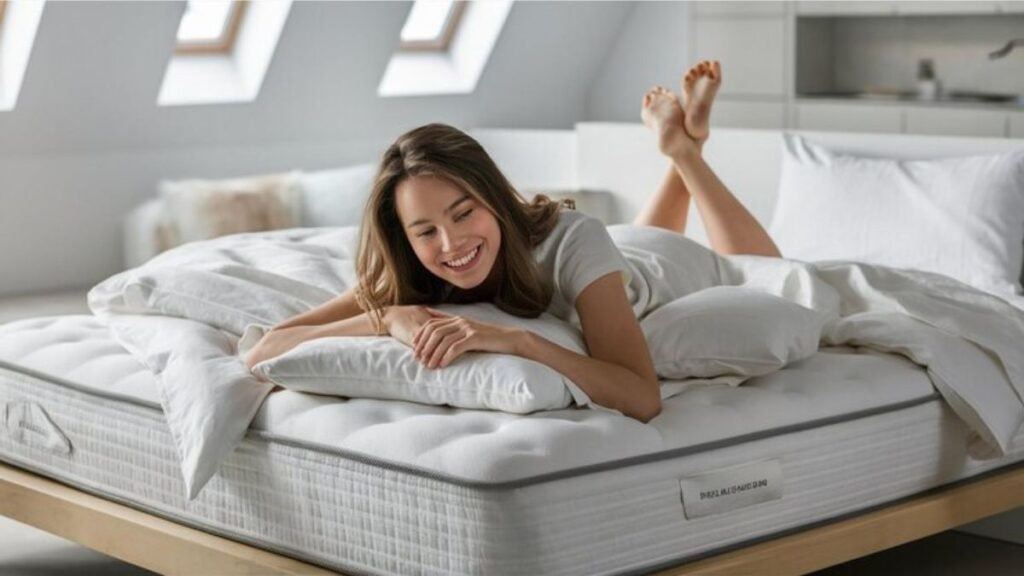Why Choose a Soft Mattress for Better Sleep
If you’re someone who values comfort and enjoys the sensation of sleeping “in” your bed rather than “on” it, a soft mattress might be your best bet. Soft mattresses are specifically designed to provide exceptional pressure relief, particularly for side sleepers or anyone with joint pain. Unlike firm beds, soft mattresses contour to your body’s curves, offering a gentle cradle that can alleviate discomfort and enhance relaxation.
In today’s market, there are countless options claiming to be the best soft mattress. From memory foam marvels to luxurious hybrid builds, selecting the right one requires a deeper understanding of your body’s needs and sleep habits. This guide will walk you through everything you need to know to make an informed, cozy choice.
Who Should Sleep on a Soft Mattress
Soft mattresses aren’t ideal for everyone, but they can be game-changers for certain sleepers. People who benefit most include:
- Side Sleepers: A soft mattress cushions the shoulders and hips, reducing tension in pressure-prone areas.
- Petite Sleepers: Lighter individuals don’t compress firmer mattresses enough to get proper support; softer mattresses suit them better.
- Couples: Soft mattresses often minimize motion transfer, meaning you’re less likely to be disturbed by a partner’s movements.
- Chronic Pain Sufferers: If you deal with conditions like fibromyalgia or arthritis, a soft mattress can offer much-needed relief.
If you fall into one of these categories, your search for the best soft mattress could significantly improve your sleep quality and overall well-being.
What Makes a Mattress Soft
When we talk about mattress softness, we’re referring to its firmness level, usually rated on a scale from 1 to 10. A soft mattress generally lands in the 1 to 4 range, with 1 being the softest.
Softness is influenced by materials like memory foam, latex, and pillow tops. These layers provide a plush feel while allowing the mattress to conform closely to your body. Support cores, often made from denser foam or innerspring coils, help maintain spinal alignment so you don’t sink in too far.
It’s important to note that softness doesn’t mean lack of support. A good soft mattress provides a balance between a plush surface and a stable core, so your spine stays properly aligned.
Types of Soft Mattresses
Understanding the different mattress types is crucial when searching for the best soft mattress. Each type offers unique advantages depending on your personal preferences.
Memory Foam Mattresses
Memory foam is famous for its deep contouring and slow response to pressure. It hugs your body, creating a “sinking in” sensation that’s ideal for relieving joint pain. Memory foam is also excellent at isolating motion, making it a top choice for couples.
Latex Mattresses
Latex mattresses are softer than innerspring beds but offer more bounce and quicker responsiveness than memory foam. Natural latex is also hypoallergenic and breathable, ideal for eco-conscious buyers or hot sleepers who still want a plush feel.
Hybrid Mattresses
Hybrids combine the best of both worlds: the comfort of foam with the support of coils. These mattresses often feature thick comfort layers and offer a luxury feel, making them a popular pick for people who want softness without sacrificing support.
Pillow Top Mattresses
A pillow top mattress includes an extra layer of padding stitched to the top, providing an additional softness that can feel cloud-like. It’s commonly found in innerspring or hybrid designs and is great for those who want an ultra-soft sleep surface.
Key Features to Look for in the Best Soft Mattress
When you’re on the hunt for the best soft mattress, there are several features to keep in mind. These elements determine comfort, longevity, and overall sleep quality.
Pressure Relief
Soft mattresses should cradle your body and alleviate pressure points. Look for models with responsive comfort layers that mold to your curves, especially if you’re a side sleeper.
Edge Support
Many soft mattresses tend to sag at the edges, which can make you feel like you’re sliding off. Choose a bed with reinforced edges if you sleep near the side or sit on the bed frequently.
Temperature Regulation
Some soft mattresses trap heat, especially memory foam models. If you’re a hot sleeper, opt for breathable options with cooling gels, open-cell foams, or latex for better airflow.
Durability
Soft mattresses can wear out faster than firm ones. Check for high-density foams and quality materials that offer long-lasting support and resist sagging over time.
Motion Isolation
This is especially important if you share your bed. Good motion isolation ensures that your partner’s movements don’t disturb your sleep.
How Sleeping Position Affects Soft Mattress Suitability
Your preferred sleeping position plays a major role in determining how soft your mattress should be.
Side Sleepers
Side sleepers typically benefit most from soft mattresses. They need contouring to cushion the shoulders and hips, preventing numbness and joint pain.
Back Sleepers
Back sleepers need a balance between softness and support. A slightly soft mattress with a sturdy core can help maintain spinal alignment while offering gentle comfort.
Stomach Sleepers
Stomach sleepers generally need firmer mattresses to avoid sinking too deeply, which can strain the neck and lower back. Soft mattresses are usually not recommended for this position.
Benefits of Sleeping on a Soft Mattress
There are numerous benefits to owning the best soft mattress, especially for certain body types and sleep styles.
- Improved Pressure Relief: Reduces discomfort on hips, shoulders, and other pressure points.
- Enhanced Comfort: Ideal for those who enjoy plush, cloud-like surfaces.
- Better Sleep Quality: Less tossing and turning due to superior contouring.
- Motion Isolation: Helps couples sleep undisturbed through the night.
- Pain Management: Excellent for those dealing with arthritis, back pain, or injuries.
If you want to read more, visit our blog page. We have more topics!
Drawbacks to Consider
While a soft mattress has plenty of upsides, it’s important to consider potential downsides to ensure it’s the right choice for you.
- Less Support for Heavier Sleepers: May cause sinking and poor spinal alignment.
- Durability Issues: Softer materials can break down faster.
- Potential Overheating: Some soft beds trap heat more than firmer models.
- Not Ideal for Stomach Sleepers: Can cause lower back strain.
Make sure to balance these drawbacks with your specific needs to find the mattress that best aligns with your sleep style.
Tips for Choosing the Best Soft Mattress
To make a confident choice, follow these tips when shopping for your new bed.
- Test Before You Buy: If possible, try the mattress in a showroom or choose one with a risk-free sleep trial.
- Check the Return Policy: A generous return window ensures peace of mind if the mattress isn’t a fit.
- Read Customer Reviews: Real feedback can reveal insights into comfort, durability, and performance.
- Consider Your Weight: Heavier sleepers may need a soft mattress with extra support layers.
- Look for Certifications: Certifications like CertiPUR-US or OEKO-TEX ensure your mattress is made with safe, quality materials.
Conclusion
Finding the best soft mattress can feel like a dream come true for those who prioritize comfort, especially side sleepers, lightweight individuals, and people with chronic pain. With so many high-quality options on the market, from luxurious hybrids to classic memory foam models, there’s a plush bed out there for everyone.
Before making a purchase, think about your sleep position, body type, and personal preferences. A soft mattress can improve your sleep quality, reduce pain, and help you wake up feeling refreshed and rejuvenated.
Investing in the right mattress isn’t just about softness—it’s about balance, support, and ultimately, better sleep. Choose wisely, and your mattress will be the coziest companion you never knew you needed.
Should you wish to explore other topics, head to our main blog. We’ve got more!
Frequently Asked Questions
Is a soft mattress good for back pain?
It can be, especially for lighter individuals or side sleepers. However, some back pain sufferers might benefit more from medium-soft to medium-firm support to maintain proper spinal alignment.
How long does a soft mattress last?
On average, a high-quality soft mattress can last between 7 to 10 years. Longevity depends on the materials used and how well the mattress is maintained.
Can soft mattresses cause back problems?
If too soft for your body type or sleeping position, yes. Sinking too deeply can misalign the spine and lead to discomfort. Proper support is key.
Are soft mattresses hotter than firm ones?
They can be, especially memory foam models. Look for options with cooling gels or breathable materials if you tend to sleep hot.
What is the softest type of mattress?
Memory foam and pillow top mattresses are generally considered the softest. Latex can also offer softness with added bounce.







